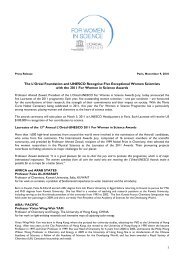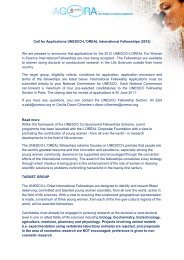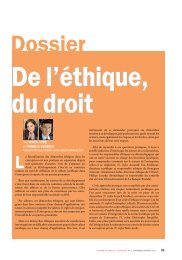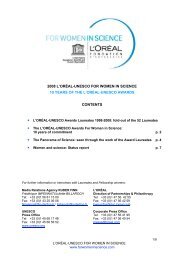CONTENTS - L'Oréal
CONTENTS - L'Oréal
CONTENTS - L'Oréal
Create successful ePaper yourself
Turn your PDF publications into a flip-book with our unique Google optimized e-Paper software.
AFRICA<br />
Burkina Faso<br />
Public Health<br />
Fati KIRAKOYA, 28, is a graduate student studying<br />
biochemistry and microbiology at the University of<br />
Ouagadougou in Burkina Faso.<br />
Ms Kirakoya is interested in assessing whether sexually<br />
transmissible infections, such as genital herpes and<br />
syphilis, or imbalance in vaginal flora, have a role to play<br />
in increasing susceptibility to HIV infection in women in<br />
Ouagadougou.<br />
HIV infection in Burkina Faso has risen dramatically<br />
since the first cases were identified in 1986. The latest<br />
figures show that 6.5% of the population is now HIVseropositive<br />
(2002 data). Sexual comportment, hygiene<br />
practices and lack of access to appropriate treatment for<br />
sexually transmissible infections are all factors<br />
contributing to an increase in HIV transmission in the<br />
country.<br />
During the first part of her fellowship, Ms Kirakoya plans<br />
to undertake a statistical study of the sexually active<br />
female population of Ouagadougou. This will involve<br />
collecting socio-demographic and behavioral data, in the<br />
form of a questionnaire and biological data in the form of<br />
blood, urine and vaginal samples from individuals who<br />
consent to take part in the study. The biological data,<br />
once analyzed, will provide evidence for sexually<br />
transmissible infections, including HIV, and for other<br />
genital infections. During the second part of her<br />
fellowship, at the Catholic University of Louvain, Ms<br />
Kirakoya will learn how to analyze and interpret the<br />
collected data using biostatistical software to establish if<br />
there is a positive association between pre-existing<br />
genital infections and susceptibility to HIV infection in<br />
FELLOWS UNESCO-L’ORÉAL 2005<br />
the studied population.<br />
On return to Burkina Faso, Ms Kirakoya hopes to be able<br />
to use the results of her study to provide input into the<br />
education and prevention programs for AIDS/HIV and<br />
sexually transmissible infections currently in place in<br />
Ouagadougou.<br />
Host institution: School of Public Health, Catholic<br />
University of Louvain, Belgium. �<br />
Côte d'Ivoire<br />
Microbiology<br />
Cho N’Din Catherine BONI-CISSE, 34, trained as a<br />
medical doctor and currently works as a hospital<br />
assistant specializing in bacteriology and virology at the<br />
central laboratory of the University Hospital of Yopougon<br />
in Abidjan, Côte d’Ivoire.<br />
During her fellowship, Dr Boni-Cisse will be focusing her<br />
attention on a bacteria, Haemophilus influenzae type b<br />
or Hib, which is responsible for a potentially fatal form of<br />
meningitis in young children. In developed countries,<br />
this form of meningitis is now rare thanks to widespread<br />
vaccination, but in many developing countries Hib<br />
infection still poses a significant threat to young<br />
children’s health.<br />
Côte d’Ivoire is planning to introduce Hib vaccination into<br />
its vaccination program, but before this can happen it is<br />
important for doctors to know which strain of the Hib<br />
bacterium is currently responsible for bacterial<br />
meningitis in Côte d’Ivoire’s children.<br />
Dr Boni-Cisse will initially isolate the bacterium from<br />
meningitis patients and study their characteristics at her

















